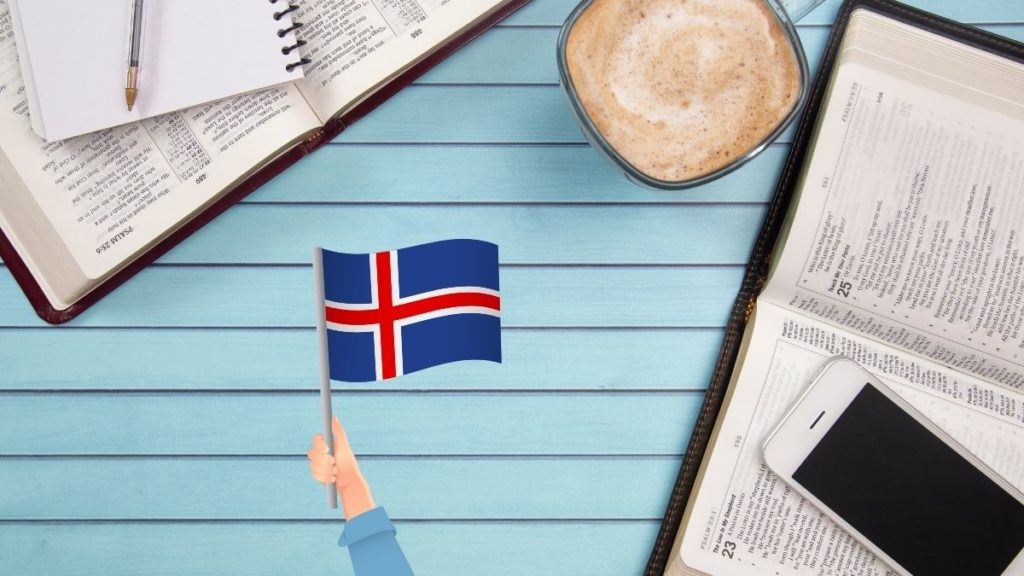Icelandic has a reputation for being an impossibly hard language to learn but how hard is it actually?
In reality, it’s not impossible to learn Icelandic and is much easier than you think.
Let’s take a look at all the reasons why people think Icelandic is hard to learn and how you can make it easier.
We’ll also discuss how long it takes to learn Icelandic for an English speaker.
Table of Contents
Is Icelandic Hard To Learn?

While Icelandic is fairly hard to learn for an English speaker, it is not the hardest language to learn as there are other languages like Chinese and Japanese which are considered to be harder.
The Foreign Service Institute has spent decades teaching foreign languages and over the years has ranked them in terms of difficulty.
The categories start from category I, which includes easy languages like French and Spanish, and go to category IV, which includes super hard languages like Mandarin Chinese and Japanese.
Icelandic falls within category III in terms of difficulty. This means that Icelandic is harder to learn than French, Spanish and German but easier to learn than Chinese or Japanese.
What Makes Learning Icelandic Hard?

Whilst there are things you can do which makes learning Icelandic easier (discussed later), Icelandic does have many complex features that make it hard to learn.
I’ve discussed the main ones below.
Pronunciation
One of the hardest parts of learning Icelandic is the pronunciation of words.
Pronunciation is difficult because the letters are pronounced completely different to their English equivalents and the letters also have lots of accents.
Words are often extremely long which also makes pronunciation hard.
Icelandic also has a few extra letters that you might not have seen before e.g. ð, æ, þ etc. You’ll have to learn the pronunciation of these and they don’t always correspond directly to a sound we have in English.
Below is some sample Icelandic text. Looks hard right!?
Hver maður er borinn frjáls og jafn öðrum að virðingu og réttindum. Menn eru gæddir vitsmunum og samvisku, og ber þeim að breyta bróðurlega hverjum við annan.
Vocabulary Is Unique
Due to Iceland’s geography, with it being far from other countries, this means that over the centuries Icelandic people didn’t mix much with other countries.
This has led to the vocabulary of the Icelandic language to be very unique, unlike most other languages. You won’t find many loanwords at all which will make study harder as almost every word you learn will be a brand new word.
One thing that has also prevented loanwords from being incorporated into the Icelandic language is ‘linguistic purism’.
Linguistic purism is a policy used in Iceland which discourages the addition of new loanwords from entering the language. Instead, new words are developed with Icelandic roots.
Difficult Grammar
Icelandic grammar is very difficult and is probably one of the hardest things about the language.
Whilst verb conjugations are really simple in English, the same cannot be said about Icelandic. Conjugations are extremely confusing and take a lot of time and practice to master.
Icelandic also has 4 cases, three voices and sub-classes for nouns. You’ll also find there are a lot of irregularities and exceptions to rules. Icelandic also has 3 genders (masculine, feminine and neuter) which doesn’t make things any easier.
Speakers Of Icelandic
One thing that makes Icelandic difficult to learn is that it is not widely spoken. There are only approximately 314,000 speakers of Icelandic in the world, most of which live in Iceland.
When learning a language, one of the best and most important ways is to immerse yourself in the language and practice with native speakers as often as possible. This can be very difficult with Icelandic, especially if you don’t live in Iceland.
If you do live in Iceland or in another community with native Icelandic speakers then this shouldn’t be an issue for you.
What Makes Learning Icelandic Easier?

There are a few things that do actually make learning Icelandic much easier. I’ve summarised them all below.
Language Families
English and Icelandic are both part of the Indo-European language family.
Both languages fall under the Germanic branch of this language family. However, English is a West Germanic language whereas Icelandic is a North Germanic language so they fall under different subdivisions of this branch.
As Icelandic and English are part of the same language family this means they both descended from the same ancestral language known as the Proto-Indo-European language.
Learning languages from the same language family tends to be easier as these languages share many similar characteristics with one another.
The similarities vary between languages but can include vocabulary, word order, grammar, pronunciation and word composition.
Despite being from the same language family, Icelandic is often ranked as one of the harder Indo-European languages to learn for English speakers. It’s much harder than other Germanic languages and Romance languages.
This is mainly due to it’s complex grammar and archaic vocabulary.
The Alphabet Is Familiar
One thing that will be familiar to you is the Icelandic alphabet. Luckily, Icelandic uses the same alphabet as English so you don’t have to spend hours learning a new script.
There are some minor differences such as accents and a couple of additional letters but the core of the alphabet is the same.
Knowing A Similar Language
Learning Icelandic will be much easier if you speak another similar language.
The most closely related languages to Icelandic are Faroese, Danish, Norwegian and Swedish.
If you happen to also speak one of these languages then Icelandic will be a lot easier for you.
How You Can Learn Icelandic Easily

Learning Icelandic is made much easier with good quality courses and resources. Below I’ve listed the best ones which will make learning Icelandic easy!
Pimsleur Icelandic
Pimsleur is a fantastic audio course that will get you speaking from day 1.
This course is perfect for anyone who wants to focus on being able to speak the language (rather than reading and writing).
You can try Pimsleur Icelandic for free to see if you like it.
Glossika
Glossika is a great resource for building up vocabulary and learning to speak the Icelandic language fluently.
The best thing about Glossika is that they help you to acquire the language (rather than memorizing).
It’s a fun, easy and effective way to learn Icelandic. Try Glossika Icelandic to see if you like it.
Icelandic Textbook
If you’re looking for a standard textbook to help you with Icelandic then the Teach Yourself Icelandic book is one of the best out there.
If you also want to be able to read and write in Icelandic then you’ll need a textbook like Teach Yourself Icelandic book.
It’s a great reference point and explains the language in clear, easy to understand terms.
How Long Does It Take To Learn Icelandic For An English Speaker?

On average it would take about 1100 hours or 44 weeks to learn Icelandic for an English speaker.
This is based on the language classification system created by the Foreign Service Institute.
The Foreign Service Institute has several language categories that categorize how long it takes for a student to reach ‘professional working proficiency’ in a language.
They have put Icelandic into category III which they describe as ‘hard languages’ which are ‘languages with significant linguistic and/or cultural differences from English’.
Other languages that fall into this category include Russian, Finnish, Polish and many more.
1100 hours or 44 weeks is the average time that it takes students to learn to speak Icelandic, however this can vary depending on many factors.
This assumes you do 25 hours of studying a week. If you’re not able to dedicate this much time to learning Icelandic it may take you longer.
Your progress may actually be much faster if you already speak a similar language such as Faroese, Danish, Norwegian or Swedish.
Is Icelandic Worth Learning?

The answer to whether Icelandic is worth learning is really up to you.
As I mentioned previously, it would take you roughly 1100 hours or 44 weeks to learn Icelandic. This is a lot of time and effort and you have to have a lot of motivation and discipline to achieve this.
If you do decide to learn Icelandic you will get a lot out of it.
Icelandic is spoken by around 314,000 people around the world, mainly in Iceland.
The Icelandic people are known to be super friendly and accommodating and will be more than happy to help you with their language.
By learning Icelandic you would be able to communicate with 314,000 people and enjoy their vibrant and interesting culture.
This can range from movies, TV shows, music, comics, books and much more.
Related Post: Is Icelandic A Dying Language?
If you’re interested in learning Icelandic why not start by learning how to say hello in Icelandic.
Check out our other Icelandic content here.
Related Posts:
